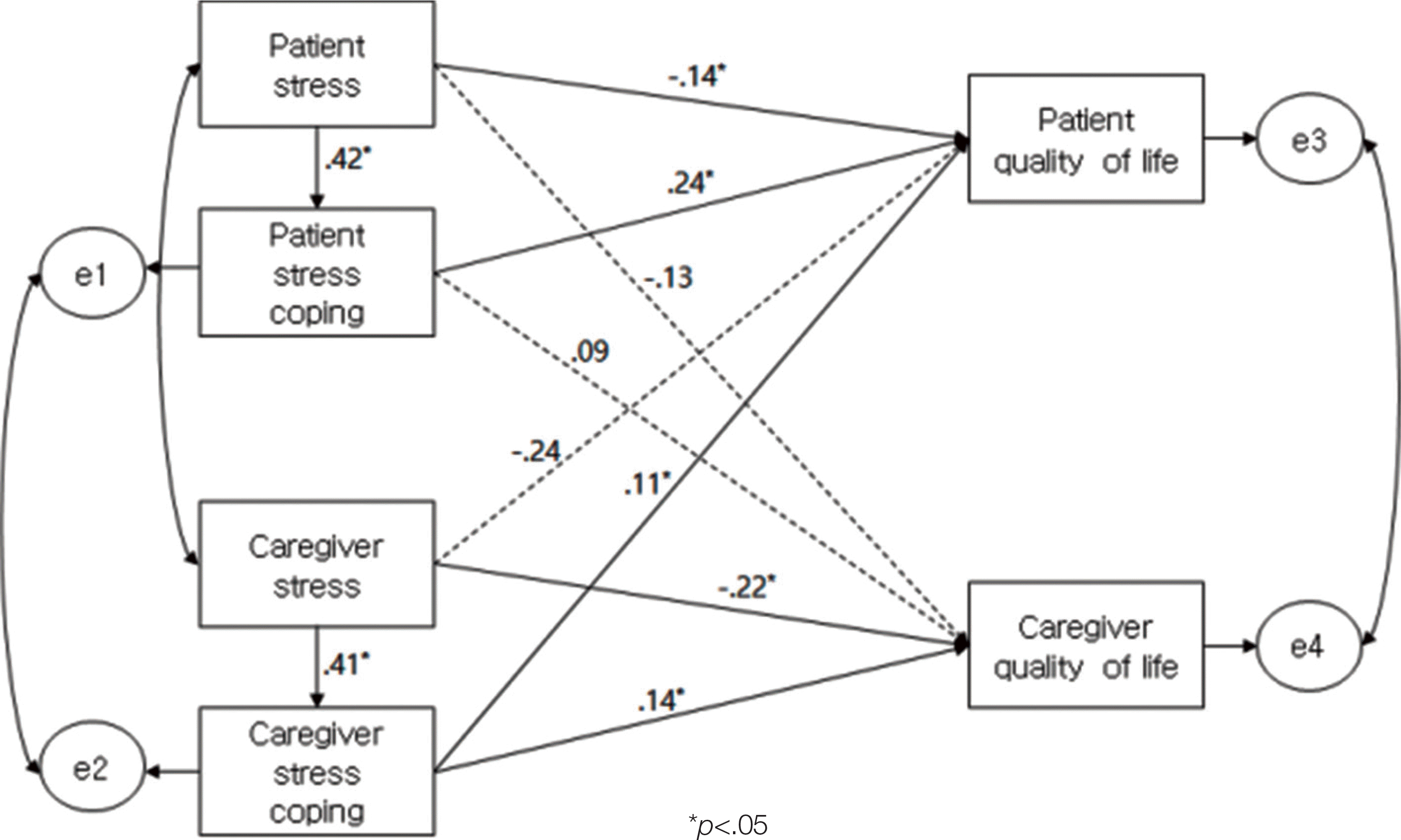초록
Purpose
This study is to determine actor and partner effects of stress coping on quality of life (QoL) of cancer patients and their primary caregivers using an actor-partner independence model (APIM).
Methods
The subjects of this study were adults aged 19 years and over who visited a hospital. They were diagnosed with cancer and were treated with chemotherapy, radiotherapy, and hemato-poietic stem cell transplantation. 137 patients with cancer and 137 caregivers were included in the study.
Results
Cancer patient stress had a direct effect on their stress coping (β=.42, p=.004). Primary caregiver stress also had a direct effect on their stress coping (β=.41, p<.001). Factors significantly affecting cancer patients’ QoL were patient stress (β=-.14, p=.002), stress coping (β=.24, p<.001), and primary caregiver stress coping (β=.11, p=.021). Factors significantly affecting primary caregiver QoL were primary caregiver stress (β=-.22, p<.001) and their stress coping (β=.14, p=.009).
REFERENCES
1. National Cancer Information Center (KR). 5 year survival rate of major cancers [Internet]. Available from. http://www.cancer.go.kr/mbs/cancer/. [Accessed November 1, 2017].
2. Lee KE, Son YG. Research trends of quality of life after gastrectomy among gastric cancer patients in Korea. Asian Oncol Nurs. 2016; 16:59–66.

3. de Haes JC, Stiggelbout AM. Assessment of values, utilities and preferences in cancer patients. Cancer Treat Rev. 1996; 22(Suppl A):13–26.

4. An H, Nho JH, Yoo S, Kim H, Nho M, Yoo H. Effects of lifestyle intervention on fatigue, nutritional status and quality of life in patients with gynecologic cancer. J Korean Acad Nurs. 2015; 45:812–22.

5. Jang OJ, Woo SH, Park YS. Effects of telephone follow-up on the self-care performance for cancer patients undergoing chemotherapy and role stress of family caregivers. J Korean Acad Fundam Nurs. 2006; 13:50–9.
6. Kang JY. The influence of stress, spousal support, and resilience on the ways of coping among women with breast cancer [dissertation]. Seoul: Seoul National Univ.;2012.
7. Sung IS, Kim JY, Noh GO, Ahn KD, Ryu EJ, Kwon IG. Quality of life and family burden in cancer patients. J Korean Acad Adult Nurs. 2007; 19:603–13.
8. Kim Y, Carver CS, Spillers RL, Love-Ghaffari M, Kaw CK. Dyadic effects of fear of recurrence on the quality of life of cancer survivors and their caregivers. Qual Life Res. 2012; 21:517–25.

9. Lee JH, Park HK, Hwang IC, Kim HM, Koh SJ, Kim YS, et al. Factors associated with care burden among family caregivers of terminally Ill cancer patients. Korean J Hosp Palliat Care. 2016; 19:61–9.

10. Cheon SS. A study on the relationship among family support, stress and quality of life on according to the phases of illness in breast cancer patients [dissertation]. Jinju: Gyeongsang National Univ.;2008.
11. Dionne-Odom JN, Hull JG, Martin MY, Lyons KD, Prescott AT, Toste-son T, et al. Associations between advanced cancer patients’ survival and family caregiver presence and burden. Cancer Med. 2016; 5:853–62.
12. Kershaw T, Northouse L, Kritpracha C, Schafenacker A, Mood D. Coping strategies and quality of life in women with advanced breast cancer and their family caregivers. Psychol Health. 2004; 19:139–55.

13. Pankrath AL, Weißflog G, Mehnert A, Niederwieser D, Döhner H, Hönig K, et al. The relation between dyadic coping and relationship satisfaction in couples dealing with haematological cancer. Eur J Cancer Care (Engl). 2018; 27:e12595.

14. La IS. Effects of stress appraisal on the quality of life of adult patients and their primary family caregivers with multiple myeloma: testing dyadic dynamics using actor-partner interdependence model [dissertation]. Seoul: Kyung Hee Univ.;2015.
15. Lee IJ. Marital adjustment of cancer patients and their spouses: focusing on the actor effect and partner effect [dissertation]. Seoul: Ewha Wom-ans Univ.;2011.
16. Fisch GS, Cohen IL, Jenkins EC, Brown WT. Screening developmen-tally disabled male populations for fragile X: the effect of sample size. Am J Med Genet. 1988; 30:655–63.

18. Kang YS. A study on the awareness of stress due to hospitalization [dissertation]. Seoul: Yonsei Univ.;1984.
19. McCubbin HI, Thompson AI. Family assessment inventories for research and practice. Madison, WI: Wisconsin-Madison Univ. 1987.
20. Yang KH, Song MR, Kim E. The stress and adaptation in family caregiver of chemotherapy patients. The Seoul Journal of Nursing. 1998; 12:118–32.
21. Moorey S, Frampton M, Greer S. The cancer coping questionnaire: a self-rating scale for measuring the impact of adjuvant psychological therapy on coping behaviour. Psychooncology. 2003; 12:331–44.

22. Kim JN, Kwon JH, Kim SY, Yu BH, Hur JW, Kim BS, et al. Validation of Korean-cancer coping questionnaire (K-CCQ). Korean J Health Psychol. 2004; 9:395–414.
23. Lazarus RS, Folkman S. Stress, appraisal, and coping. New York, NY: Springer;1984.
24. Yang YH. The relationship of caregiving stress, coping methods, social support and health of the caregivers of patients with cancer according to the phases of cancer illness. J Korean Acad Adult Nurs. 1998; 10:435–45.
25. Cella DF, Tulsky DS, Gray G, Sarafian B, Linn E, Bonomi A, et al. The functional assessment of cancer therapy scale: development and validation of the general measure. J Clin Oncol. 1993; 11:570–9.

26. Min SK, Kim KI, Suh SY, Kim DK. Development of the Korean version of the world health organization quality of life scale (WHOQOL). J Korean Neuropsychiatr Assoc. 2000; 39:78–88.
27. Jeong SG. The relationship among resilience, stress and self care of cancer patients receiving chemotherapy [dissertation]. Jinju: Gyeongsang National Univ.;2012.
28. Badr H, Carmack CL, Kashy DA, Cristofanilli M, Revenson TA. Dyadic coping in metastatic breast cancer. Health Psychol. 2010; 29:169–80.

29. Kim KS. A study on the relationship between perceived family support and quality of life of cancer patients [dissertation]. Daejeon: Daejeon Univ.;2003.
Table 1.
Descriptive Statistics on Stress, Stress Coping and Quality of Life of Cancer Patients and Caregivers (cancer patient: N =137, caregiver: N = 137)
Table 2.
The Correlation among Variables
Table 3.
Effects of Predictor Variables in the Model




 PDF
PDF ePub
ePub Citation
Citation Print
Print



 XML Download
XML Download